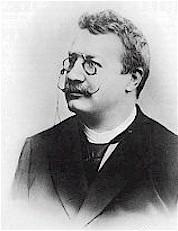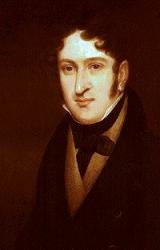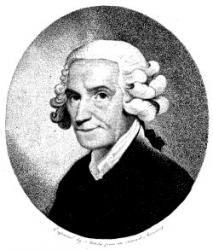Planning worship?
Check out our sister site, ZeteoSearch.org,
for 20+ additional resources related to your search.
- |
User Links
Person Results
‹ Return to hymnal




Export as CSV
George A. Minor
1845 - 1904 Person Name: Geo. A. Minor Hymnal Number: 215 Composer of "[Sowing in the morning, sowing seeds of kindness]" in Triumphant Songs No.3 George A. Minor was a native of Richmond, Virginia. He was an active member of the First Baptist church and led the singing in the Sunday school of that church. He composed several Sunday school hymns. He worked for the Hume-Minor Company, a piano and music dealer, and for the Mason-Hamlin Company,a piano manufacturer.
Dianne Shapiro, excerpted from obituary in "Richmond Times-Dispatch," January 31, 1904
George A. Minor
William Tans'ur

1699 - 1783 Person Name: Wm. Tansur Hymnal Number: 150 Composer of "ST. MARTIN'S" in Triumphant Songs No.3 William Tansur, b. about 1700, Dunchurch of Barnes; d. 1783, St. Neots Evangelical Lutheran Hymnal, 1908
Also known as Tansur; Tanzer; le Tansur
William Tans'ur
Lizzie Tourjée
1858 - 1913 Person Name: Lizzie S. Tourjee Hymnal Number: 144 Composer of "WELLESLEY" in Triumphant Songs No.3 Lizzie Shove Tourjee Estabrook USA 1858-1913. Born in Newport, RI, daughter of a famed music educator, organist, and composer, he encouraged her efforts at composing. When 17, she composed the tune for the famous hymn “Wellesley”. When her father, founder of the New England Conservatory of Music, became editor of the Methodist hymnal, he included her tune in the 1878 edition of the book, naming it for the college she attended, as she had written the tune while attending that school. She married Franklin Estabrook in 1883. They had a son, Rufus. She taught music and was an organist in Auburndale, MA. She died in Newton, MA.
John Perry
Lizzie Tourjée
George D. Moore
1800 - 1900 Person Name: Geo. D. Moore Hymnal Number: 115 Composer of "[My soul in sad exile was out on life's sea]" in Triumphant Songs No.3 He was an itinerant evangelist in NJ & PA in the latter 1800s. He wrote the music to Henry Lake Gilmour’s hymn lyrics of 1885.
John Perry
George D. Moore
Thomas Koschat

1845 - 1914 Person Name: Koschat Hymnal Number: 77 Composer of "[O turn ye, O turn ye, for why will ye die]" in Triumphant Songs No.3 Thomas Koschat Austria 1845-1914. Born at Viktring, Austria, he studied chemistry in Vienna (1865-67). A Roman Catholic, in 1866 he joined the Vienna State Opera and sang bass in the Hofoper (court opera) Choir, and eventually became choir director. In 1874 he joined the choir at St. Stephen’s Cathedral. In 1877 he joined the Hofmusikkapelle (choir) and served as a soloist there. From 1877-1906 he founded and sang with the Koschat Quintet, touring Europe and America extensively. He was well-known for his ‘Karntnerlider’ Carinthian folk songs. Emperor Wilhelm awarded him the ‘Adler Order of the Red Eagle’. He wrote several books and also published a book of poems in the Carinthian dialect. He died in Vienna, Austria. He was a musician, author, composer, librettist, adapter, and contributor.
John Perry
Thomas Koschat
Guillaume Franc
1500 - 1570 Person Name: G. Franc Hymnal Number: 230 Composer of "OLD HUNDRED" in Triumphant Songs No.3
Guillaume Franc
Robert Seagrave
1693 - 1759 Hymnal Number: 146 Author of "Rise, My Soul" in Triumphant Songs No.3 Robert Seagrave was born at Twyford, Leicestershire, in 1693. He studied at Clare Hall, Cambridge, graduating in 1718. In 1739, he was appointed Sunday Evening Lecturer at Lorimer's Hall, London. He afterwards preached in the Tabernacle, in connection with the Calvinistic Methodists. The date of his death is unknown. He published some treatises on doctrinal subjects, and on the duties of the ministry. In 1742, he published "Hymns for Christian Worship." His hymns have been published by Sedgwick (1860).
--Annotations of the Hymnal, Charles Hutchins, M.A., 1872.
====================================
Seagrave, Robert, M.A., son of Robert Seagrave, Vicar of Twyford, Leicestershire, was born at Twyford, Nov. 22, 1693, and educated at Clare College, Cambridge, where he graduated in 1714. Taking Holy Orders he entered most earnestly into the movement then being carried forward by the Wesleys and Whitefield; and between 1731 and 1746 he issued numerous letters and pamphlets, &c, designed to awaken in the clergy a deeper earnestness in their work. In 1739 he was appointed Sunday Evening Lecturer at Loriners' Hall, London, where he continued to preach till 1750. He also occupied Whitefield's Tabernacle from time to time. His hymns, which were better known and more highly appreciated by the older compilers than those in modern days, and will still repay perusal, were included in his collection, published by him for use at the Loriner's Hall, as Hymns for Christian Worship, partly composed, and partly collected from Various Authors, 1742. The 4th edition was published in 1748, and the originals were reprinted by D. Sedgwick as Seagrave's Hymns, in 1860. Two of these hymns are still in common use:—
1. Now may the Spirit's holy fire. Opening of a Place of Worship. This, from Hymns for Christian Worship, &c, 1742, was given by G. Whitefield as the opening hymn of his Hymns for Social Worship, &c, 1753. It was repeated in Toplady's Psalms & Hymns, 1776; and again in later collections to modern hymnbooks.
2. Rise, my soul, and stretch thy wings. Pilgrim's Song. Also from his Hymns, &c, 1742, into G. Whitefield's Hymns, &c, 1753; and again in others to modern hymn books.
--John Julian, Dictionary of Hymnology (1907)
Robert Seagrave
M. P. Ferguson
1850 - 1932 Hymnal Number: 132 Author of "What Shall it Profit Thee?" in Triumphant Songs No.3 Manie Payne Ferguson United Kingdom 1850-1932. Born in Carlow, Ireland, in 1883 she married Theodore Pollock Ferguson, a past Presbyterian minister from Ohio, who had become an itinerant evangelical preacher. They moved to Los Angeles, CA, in 1885. He became a pioneer leader in the American Holiness Movement, a Christian evangelist, and social worker, founding, along with her husband, the non-denominational Peniel Mission in 1886. In 1894 they received a significant financial donation from George Studd allowing them to expand the mission. They constructed a 900-seat auditorium and ministry centre there in Los Angeles. They partnered with Studd and Phineas Bresee, each acting as a superintendent of the mission organization. In 1894 Dr. Joseph Widney, President of USC, led the dedication Praise service, and Bresee preached the later service. Widney and Bresee separated from the mission in 1895 to form the Church of the Nazarene, and Manie Fergusion provided primary leadership of the Peniel Mission. The mission provided ministry especially for single women, who lived in rented rooms near the auditorium, where evangelical services were held. The Fergusions managed to live on income from three small houses they owned, and mission rents and donations covered mission expenses. Street-corner meetings were held in the afternoon, evangelical services at night, and a meal was served afterward. Converts were asked to join a local church of their choice. Manie continued the mission work after her husband's death until her own death. In 1947 the mission became part of the World Gospel Mission enterprise. Manie wrote many poems and also authored hymn lyrics. She died in Los Angeles.
John Perry
M. P. Ferguson
Henry R. Bishop

1786 - 1855 Person Name: Sir. H. R. Bishop Hymnal Number: 152 Composer of "HOME" in Triumphant Songs No.3 Bishop, Henry Rowley, was born at London, Nov. 18, 1786, and died at London, April 30, 1855. See a full notice in the Dictionary of Nat. Biog., v., 91. From 1840 he was occasional and from 1843 to 1848 sole conductor of the Antient Concerts. Of his Twelve Corales...as sung at the Concerts of Ancient Music, for which (with Words expressly written to them) they were adapted and arranged by Sir Henry R. Bishop, 1844 (B. M. copy is H. 878), some are fairly literal translations from the German, others have no connection with their nominal originals. Three were noted in this Dictionary, but their source not having been traced in 1892, we now subjoin them:—
1. Behold, how glorious is yon sky, p. 127, ii. This is from "Wie herrlich ist die neue Welt" in C. H. Graun's oratorio Der Tod Jesu, 1756 (B. M. copy, 11. 1805, catalogued as 1766), the words being by Karl Wilhelm Ramler, b. Feb. 25, 1725, at Colberg, in Pomerania; 1748, Professor of Literature at the Cadet School in Berlin; d. at Berlin, April 11, 1798.
2. God is our Refuge in distress, Our Shield, p. 325, i.
3. O let us praise the Lord, With hearts of true devotion, p. 963, ii., No. 4. The Winchester Hymn Book, 1857, alters stanza i., the original line 1. 3, 4 being:—
"Whose spirit roams abroad,
To calm life's troubled ocean."
Another fairly close version is,"Wake, O wake! a voice is crying," from "Wachet auf," p. 805, ii. [Rev. James Mearns, M.A.]
--John Julian, Dictionary of Hymnology, New Supplement (1907)
Henry R. Bishop
James Nares

1715 - 1783 Hymnal Number: 146 Composer of "AMSTERDAM" in Triumphant Songs No.3 Born: April 19, 1715, Stanwell, Middlesex, England.
Died: February 10, 1783.
Buried: St. Margaret’s, Westminster, England.
After his family moved to Oxford, Nares became a chorister in the Chapel Royal. He later became deputy organist at St. George’s Chapel, Windsor; organist in York Cathedral (1734); and organist in the Royal Chapel and composer to the king (1756). He received a doctorate of music degree from Cambridge University in 1756. In 1770, the Catch Club awarded him a prize for his glee To All Lovers of Harmony.
Sources:
Frost, p. 683
Nutter, p. 462
http://www.hymntime.com/tch/bio/n/a/r/nares_j.htm
====================
http://en.wikipedia.org/wiki/James_Nares
James Nares


 My Starred Hymns
My Starred Hymns


